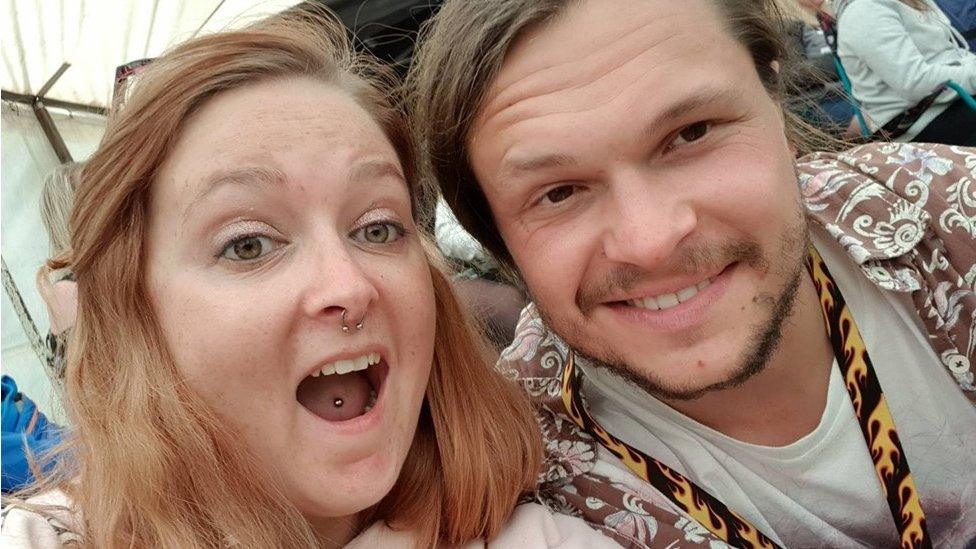Kidney donation: Would you give an organ to a stranger?
- Published

Ceri Nelson rang the hospital to offer her kidney the same day she heard a radio broadcast about donation
Would you make an on-the-spot decision to donate a kidney to a stranger?
Ceri Nelson, 63, a chartered accountant, did just that. She was running her own business and had an active life, with little free time for something like voluntary work.
What motivated her?
"I was in a place in my life where I was really happy. The business was going well. I thought, I'm doing really well but it would be nice if I could help somebody," she said.
"I was listening to Jeremy Vine [on BBC Radio 2] one day and he was talking to somebody who had done the same, and I thought, that's something that I could do."
About 1,000 people in the UK choose to donate a kidney every year, in the vast majority of cases to a family member or friend. Most donations, however, are still after death, with just over 2,800 total transplants in adults in the UK in 2021-22.
Just 68 of all transplants came from living non-directed donors, as these altruistic givers are now called, where they do not know who will receive their organ.
The same day she heard the broadcast, Ceri, from Porthcawl in Bridgend county, rang the University Hospital of Wales in Cardiff, which put her in touch with its transplant team.
She said she had a lot of testing, the team were "very, very thorough", and did not want her to put herself at risk.
After about six months of "very intensive" physical and psychological testing, Ceri donated her kidney in summer 2017.
"I think I only had two or three weeks off work. I had it done in the July and I think I was back in the gym in September. It's had absolutely no long-term impact on me at all. I go back every year for testing to make sure the remaining kidney is working, but everything is absolutely fine."
'It made me feel happy to help'
After seeing kidney patients both pre and post-transplant, she said: "It just made me feel happy that I was able to help somebody and give them such an improved quality of life when it's had such little impact on my life."
She admitted her adult daughters were not happy with her decision and had tried to dissuade her.
"They argued, what if they needed one? I said, 'well, you've got each other. You've got a father. If you need one, I'm sure you'll get one from somewhere.'
"I've never had any regrets and I just feel proud that I was able to help somebody. I was 57 when I did it so I wasn't young and apart from the very short term it's had no impact on me at all."
She said she believed positive thinkers were more likely to donate, adding: "I'm a glass half-full sort of person and you wouldn't consider it [if you weren't]. Not that there's any need to worry, but it obviously helps in the process.
"Once I make up my mind, I am impulsive and sometimes I don't think things through properly, but I had no qualms because the testing is so thorough."
She said her only disappointment was that she never had any contact with her recipient.
All she knows is his name, that he is English, and that following the operation he was "weeing for England, which meant it was a success".
"So hopefully he's out there somewhere and is still doing well."
'I just wish I had another one to donate'
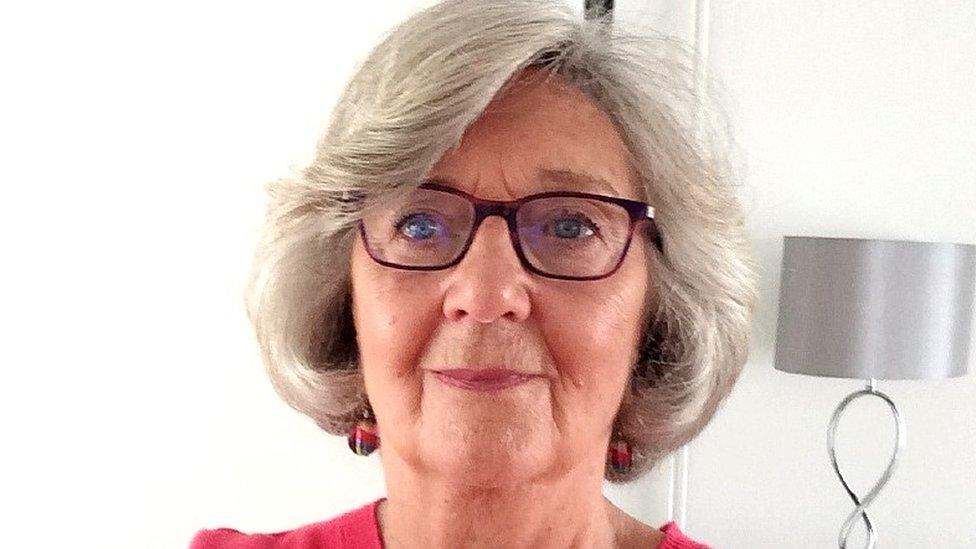
Jacqui Robins originally intended to donate to a friend
Jacqui Robins had never thought about donation before her friend became seriously unwell with untreated kidney stones and doctors said he would need a transplant.
Like Ceri, the 76-year-old retired phlebotomist from Cardiff described herself as an optimistic and quite spontaneous person, and decided she would volunteer to be his donor.
However his condition improved and he didn't need a transplant. But by this time she had received information about the process, and it got her thinking.
"When I read through it all, I thought why not take it further? See if I can donate a kidney to somebody. And that's how it all started," she explained.
"It just seemed such a simple thing to do."
After being matched with an unknown recipient, in May 2014 she had the operation.
Initially, all contact between Jacqui and her recipient was carefully controlled and kept anonymous, but this eased as time went on.
"After about a year or two I was able to send a card and sign it Jacqui, and he would sign his return Wayne. Then it was a bit more and we could talk about family life, and then about three years ago, they said if you're interested, your recipient would love to talk to you, love to meet you."

Jacqui and Wayne finally met years after she donated her kidney to him
Wayne and his wife Liz travelled to Cardiff and took Jacqui and her husband Roger out for afternoon tea.
"It was really like meeting an old friend. Even though I had never set eyes on him and neither had he seen me.
"It was all hugs and a few tears, especially from him," said Jacqui.
"It's given him life. He was in a very poor state of health and he was at desperation stages waiting and basically I've given him nine, 10 years and he's been told that he should have a lot more."
Despite donating at the age of 67, Jacqui said the procedure and living with one kidney had not had the slightest impact on her own health.
"I've never had any pain from the surgery. I just wish I had another one that I could give, because it is that easy."
Related topics
- Published24 April 2023

- Published16 December 2013
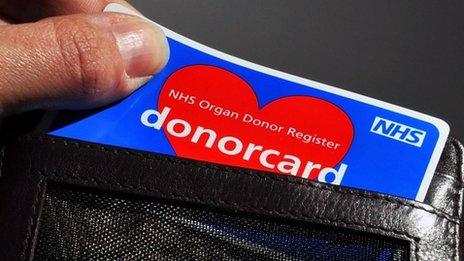
- Published13 July 2019
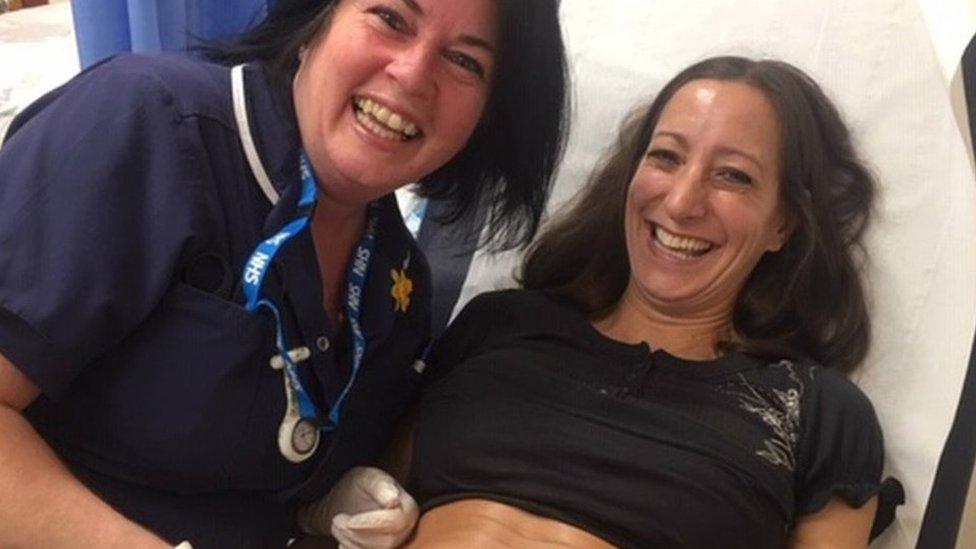
- Published10 October 2014
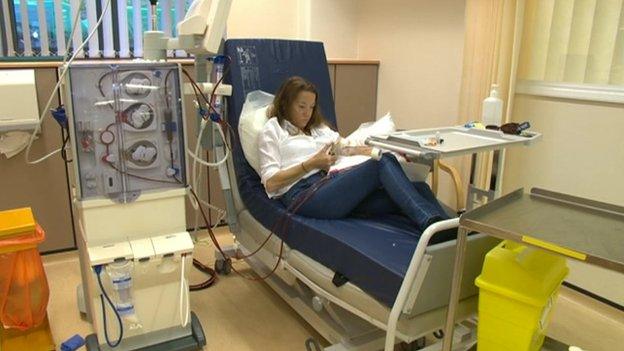
- Published11 August 2021
